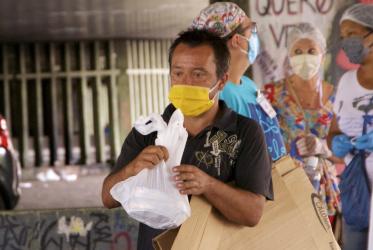Unabhängige Presbyterianische Kirche von Brasilien
(Igreja Presbiteriana Independiente do Brasil)
In 1903, a quarter of a century after the arrival of the first Presbyterian missionary in Brazil, the Independent Presbyterian Church of Brazil - known as IPIB - organized itself as a Brazilian church with 7 pastors and 15 elders. The founders under the leadership of Rev. Eduardo Carlos Pereira, were determined to be independent from the North American missionaries. Financial difficulties of the early period and the lack of pastors made the journey of the young Brazilian Protestant church difficult. Theological education for the preparation of new pastors led to the foundation of the Seminary (1905) and the acquisition of its own building (1914) in São Paulo. In 1922, the church organized its social work and in the 1930's an ecumenical youth project was designed to bring about social transformation of the nation, based on the "biblical principles and not on a static theology". In 1934, the Constitution of Brazil gave women the right to vote, and for the first time in Brazilian Protestantism a movement for deaconesses began. Also, for the first time in Latin America, a woman graduated in theology from the seminary of São Paulo. In the 1950's and 1960's, the Church had to cope with the persistent Pentecostal question. In 1993, it opened the way for understanding and dialogue.
In 2010, the Christian Reformed Church of Brazil joined the IPIB as a congregation, becoming part of its Lapa Diocese. The Christian Reformed Church was the result of mission work of the Reformed Church in Hungary among Hungarian immigrants in the early 20th century. It became a WCC member church in 1972. As a part of IPIB, it will keep the identity and the tradition of the Hungarian reformation.
For the development of its activities, the IPIB has an institutional organization divided into three ministries: mission (awareness building on 'Missio Dei'), education (programmes for continuing education, secular and Christian education) and communication (a monthly journal and a quarterly magazine). Other activities include: integral mission (health, education and evangelization), social work, social projects (such as shelter and other projects in the Amazon area), environmental and ecological projects. The denomination has three seminaries and two centres for the preparation of missionaries. The general assembly of the IPIB approved a project of theological education, emphasizing the study of the Bible, the reformed heritage and pastoral sciences. The official confession of the Church is the Westminster Confession of Faith. IPIB has been developing a project for the elaboration of a contemporary confession of faith with the objective of preparing a confessional text suitable to the local reality.
The IPIB is organized along the patterns of the Presbyterian system. The local churches are governed by male and female elders who are elected directly by their members. A group of local churches compose the presbytery which is in charge of overseeing the churches within its jurisdiction. The presbyteries, which get together regionally in 15 synods, are spread all over the national territory. Finally, the synods come together to form the general assembly, responsible for the national management of the denomination.
The IPIB has also been improving its relationship with other churches both inside and outside the country. A "fraternal Presbytery", namely the Presbytery of the Presbyterian Church of Formosa in Brazil works with the population of Taiwanese origin who live in Brazil. Partnerships have been established with the Presbyterian Church (USA), the Presbyterian Church in the Republic of Korea (PROK), the Presbyterian Church of Taiwan and the Evangelical Church of the River Plate. The IPIB is a member of CLAI and of WARC.





